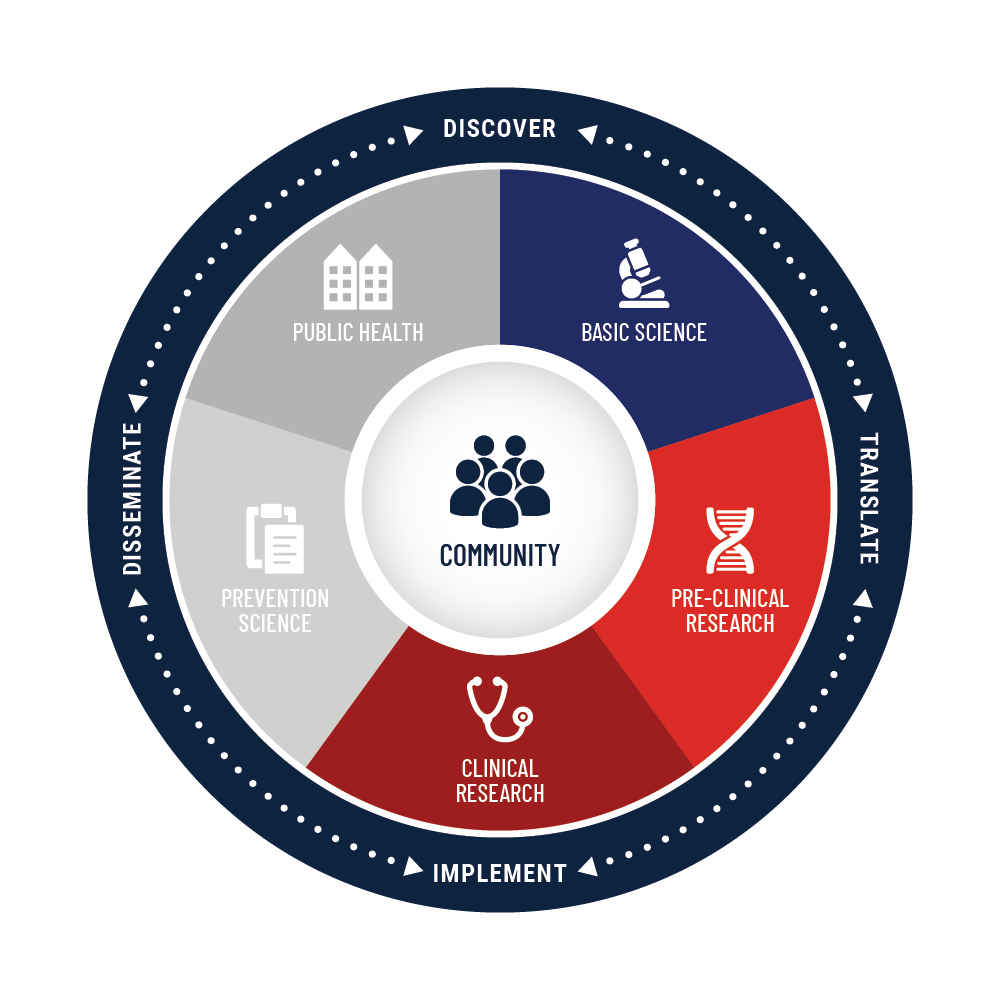The Center for AIDS Research at Emory University (Emory CFAR) has received a five-year, $11.25 million award from the National Institutes of Health (NIH) to further its work aimed at ending the HIV epidemic through the highest-caliber translational research.
First established in 1998, the Emory CFAR is part of a national network of 19 NIH-funded centers that provide administrative support, scientific services and programming to promote HIV research. The national CFAR program is particularly focused on supporting early career faculty in their journey to independent HIV investigators by offering pilot funding, mentorship and professional development. CFARs compete every five years to renew their funding and must demonstrate continued research growth, strong institutional support, active recruitment and mentoring of HIV investigators, and provide evidence of an impact in the local HIV/AIDS response.
“Across Cores, Across Campus, Across Communities — CFAR Investigators discover, translate, disseminate and implement cutting-edge HIV research in service of our stakeholders.”
The Emory CFAR is led by three principal investigators, each engaged in team science: Ann Chahroudi, MD, PhD, co-director for basic science; Colleen Kelley, MD, MPH, co-director for prevention science; and Carlos del Rio, MD, co-director for clinical science and contact PI. James W. Curran, MD, MPH, and Eric Hunter, PhD, continue to serve as emeritus directors.
“As the Emory CFAR enters its 24th year, we are extremely proud of the groundbreaking research that CFAR investigators continue to do to advance the science of HIV with the goal of ultimately ending the HIV epidemic,” says del Rio.
“It is an honor to co-direct our tremendous CFAR,” says Kelley. “Our investigators are engaged in cutting-edge science across the translational research spectrum, all while centering the communities we serve in our mission to end the HIV epidemic.”
“I am so excited about the next five years of the Emory CFAR, from the new scientific working groups that bring together investigators across Emory as well as Morehouse School of Medicine, to the new core leadership that elevates exceptional faculty with a clear aim to diversify and refresh the inclusivity of the CFAR,” adds Chahroudi. “The scope of the HIV science that we are privileged to support in Atlanta is truly unparalleled.”
Since its previous renewal, the Emory CFAR has continued and amplified its significant investments in community engagement and research that address social determinants of health, evidenced by the growth of its Community Liaison Council and the establishment of the Health Equity Scientific Working Group (SWG).
Since 2016, the Community Liaison Council has successfully worked to build a bidirectional bridge between HIV researchers and local communities. The council has proposed several new activities for the next project period that will expand on this solid foundation, aiming to bring more voices into HIV research design, implementation and dissemination.
The Health Equity SWG seeks to develop and train the next generation of outstanding and diverse HIV investigators in collaboration with Morehouse School of Medicine and other Atlanta-area HBCUs, and to expand the pipeline of community-engaged HIV research funded by NIH. This purpose is reflected by an innovative tripartite directorship: co-director Sophia Hussen, MD, MPH, is associate professor at the Rollins School of Public Health at Emory; co-director Rhonda Holliday, PhD, MA, is associate professor at the Morehouse School of Medicine; and co-director Alphonso Mills, BA, is a community health advocate at Atlanta-based Positive Impact Health Centers who is openly living with HIV.
The Emory CFAR also promotes interinstitutional collaboration through the recently established Next Generation Therapeutics SWG, which seeks to catalyze opportunities for team science related to the development of innovative and long-acting HIV treatments. Through research proposal feedback sessions, networking events and career development sessions, the working group supports opportunities for transdisciplinary collaboration among CFAR members, CDC staff and Georgia Tech and Morehouse School of Medicine faculty. The Next Generation Therapeutics SWG is led by co-director Mirko Paiardini, PhD, an associate professor at the Emory National Primate Research Center, and co-director Stefan Sarafianos, PhD, a professor at the Emory University School of Medicine.
These efforts have generated significant impact. Since the last competitive renewal in 2016, the number of publications citing the Emory CFAR has increased by 66%, with 776 peer reviewed publicationsbeing cited a total of 7,731 times. Total funding for HIV/AIDS research at Emory University has increased nine-fold since the founding of the Emory CFAR, reaching over $74 million in 2020. Since 2011, grants funded by the CFAR Developmental Core have led to 16 subsequent NIH awards, including seven R01s.
Emory’s location in metro Atlanta — a diverse region that consistently ranks in the top five U.S. cities for new HIV diagnoses — uniquely positions the Emory CFAR to lead advancements in all aspects of HIV research, faculty development, community engagement and implementation efforts to bolster the federal Ending the HIV Epidemic in the U.S. initiative.
“The recent renewal of this highly competitive NIH grant, with an outstanding score from the reviewers, highlights the enthusiasm for the vision of Emory CFAR’s next generation of leaders,” say emeritus directors Curran and Hunter. “Over the next five years, this award will lift the Emory CFAR to even greater heights and allow Emory to further its accomplishments as one of the world’s finest HIV research institutions.”
With this renewal, the Emory CFAR will continue providing critical support to member investigators so they can discover, translate, disseminate and implement cutting-edge research to end the HIV epidemic.

